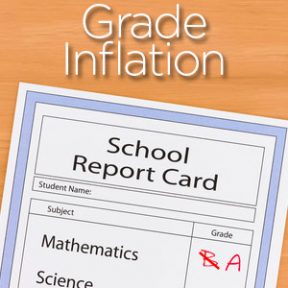…and how it will affect your child’s college admissions is alarming.
We all hear about grade inflation – when teachers give A’s to average students – and we look the other way, especially when our kids benefit from them, right? I’ve heard about teachers giving students a full-letter grade bump just for showing up to take the standardized tests at school each year. Others give students 10 points for bringing in snacks or class supplies. What’s worst of all are teachers who offer so much extra credit that students don’t do their work or study for tests because they know that one way or another, they can pull their terrible grades up to A’s by the end of the semester. None of this builds character or prepares students for college.
Grade inflation hurts the students.
Yup! Because so many schools are inflating grades – especially in white, affluent schools—colleges can’t rely on grade point averages (GPAs) to assess whether or not the students will be successful in their colleges. So when colleges can’t rely on the students’ grades, they revert to the SATs and ACTs. After all, college-bound students take the exact same test in a proctored classroom on the same day across the country. If we’re comparing apples to apples, this may seem more reliable than GPAs.
But SATs and ACTs don’t determine which students will be our next Bill Gates or Steve Jobs. Testing reading comprehension, grammar, math and science skills in a timed, multiple-choice format does not weed out students who would do poorly in college. Instead, students who do well on standardized tests today are those who can afford private SAT/ACT tutoring and spend years preparing for these tests.
Both the inflated GPA at wealthy white schools and high SAT/ACT scores due to expensive prep programs give these affluent students an unfair advantage. They aren’t better equipped to succeed in college; they’re simply able to afford to attend schools that give away A’s and spend many hours under the expensive supervision of SAT/ACT coaches.
The good news is that college admissions officers receive school profiles that list GPAs and demographics so they know which schools inflate grades. And colleges that require personal statements, essays, letters of recommendation and interviews use an eclectic approach to selecting their incoming classes. When a student stands out because they’ve done a project or something remarkable, colleges notice.
[Source]


